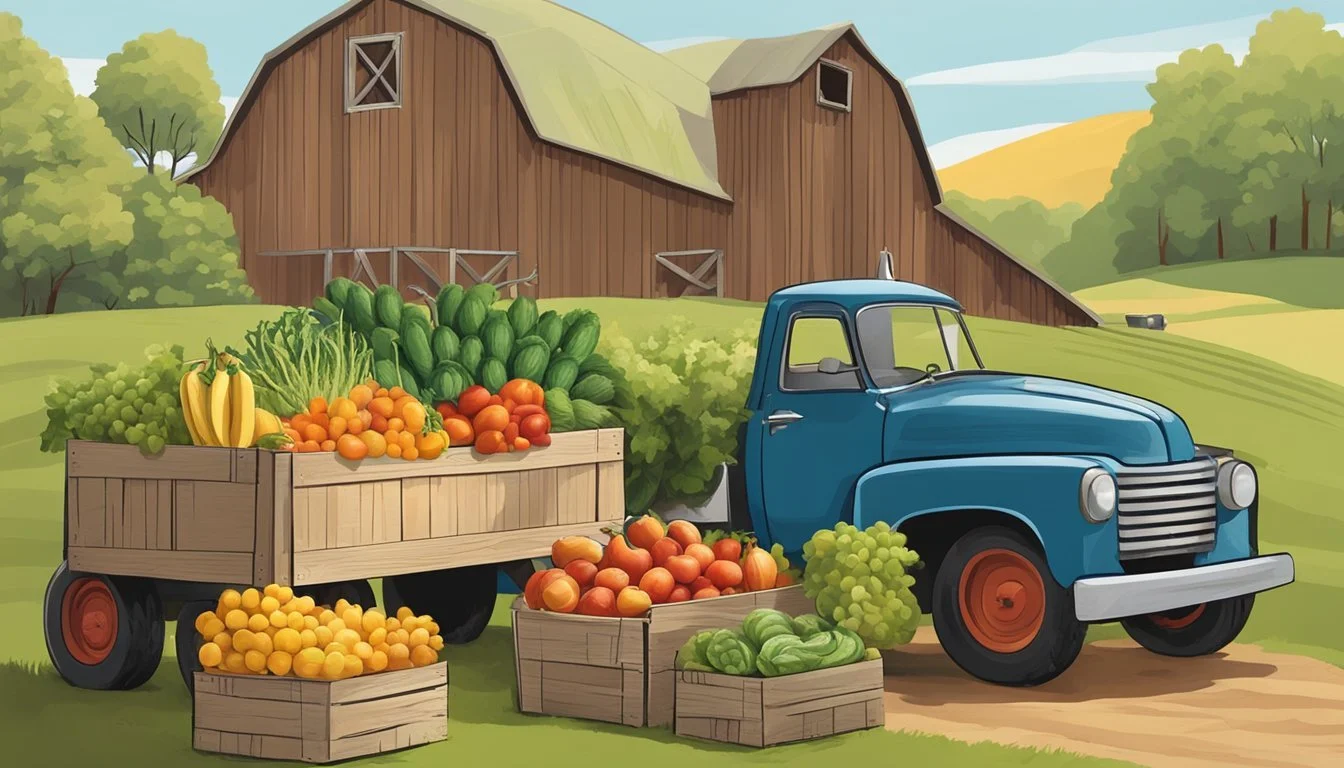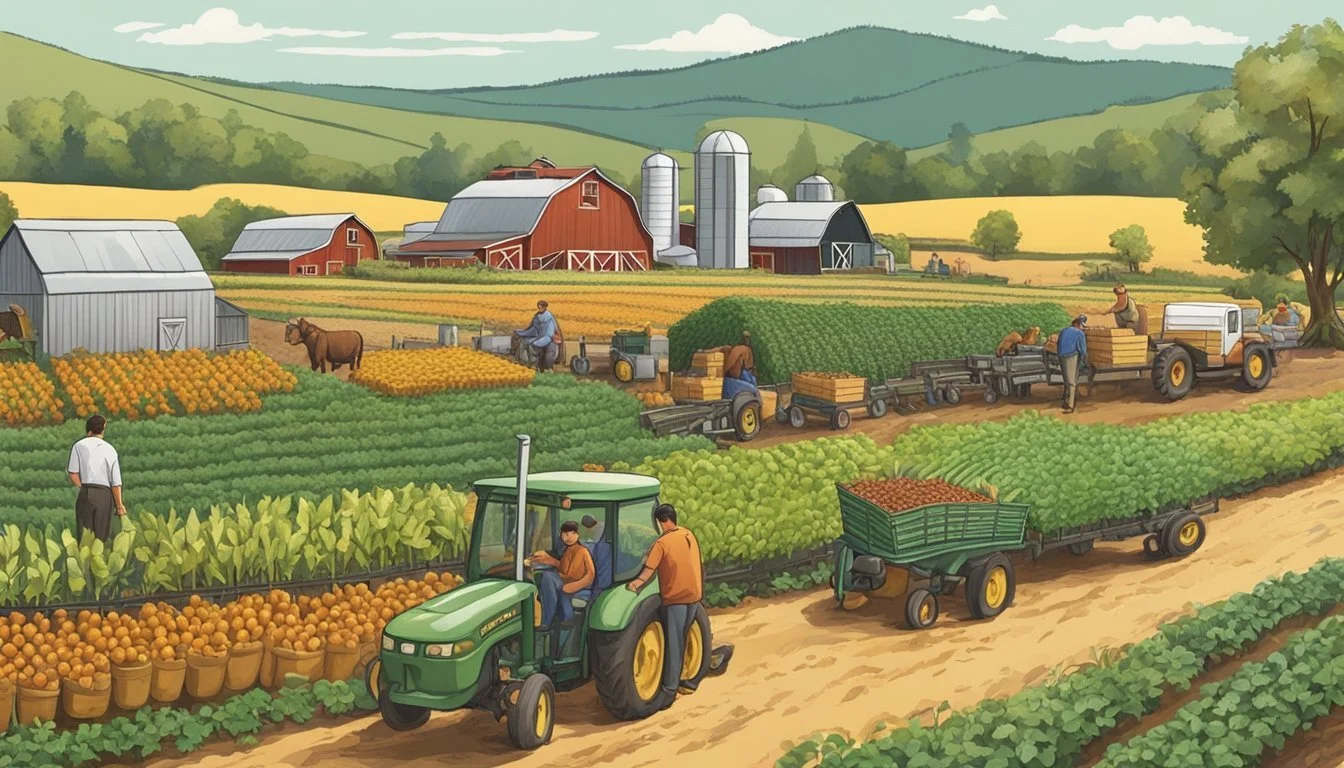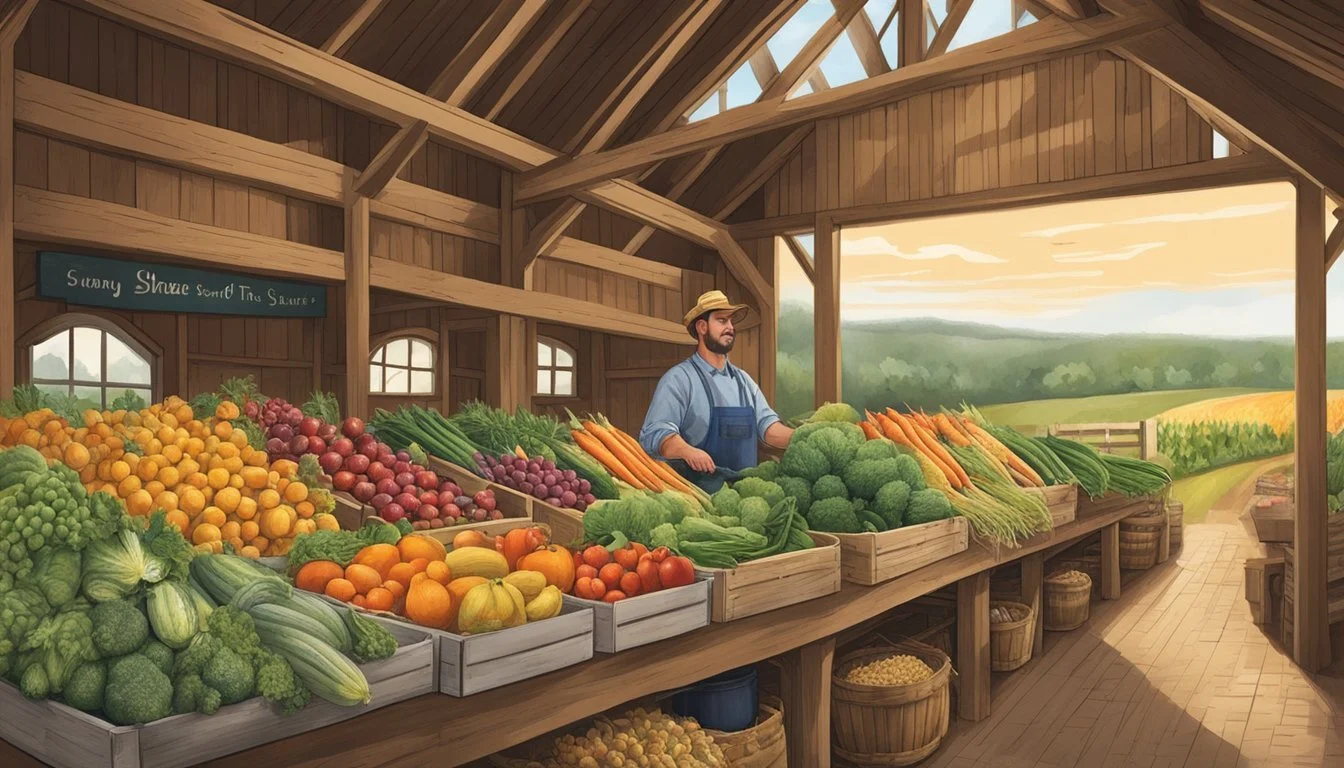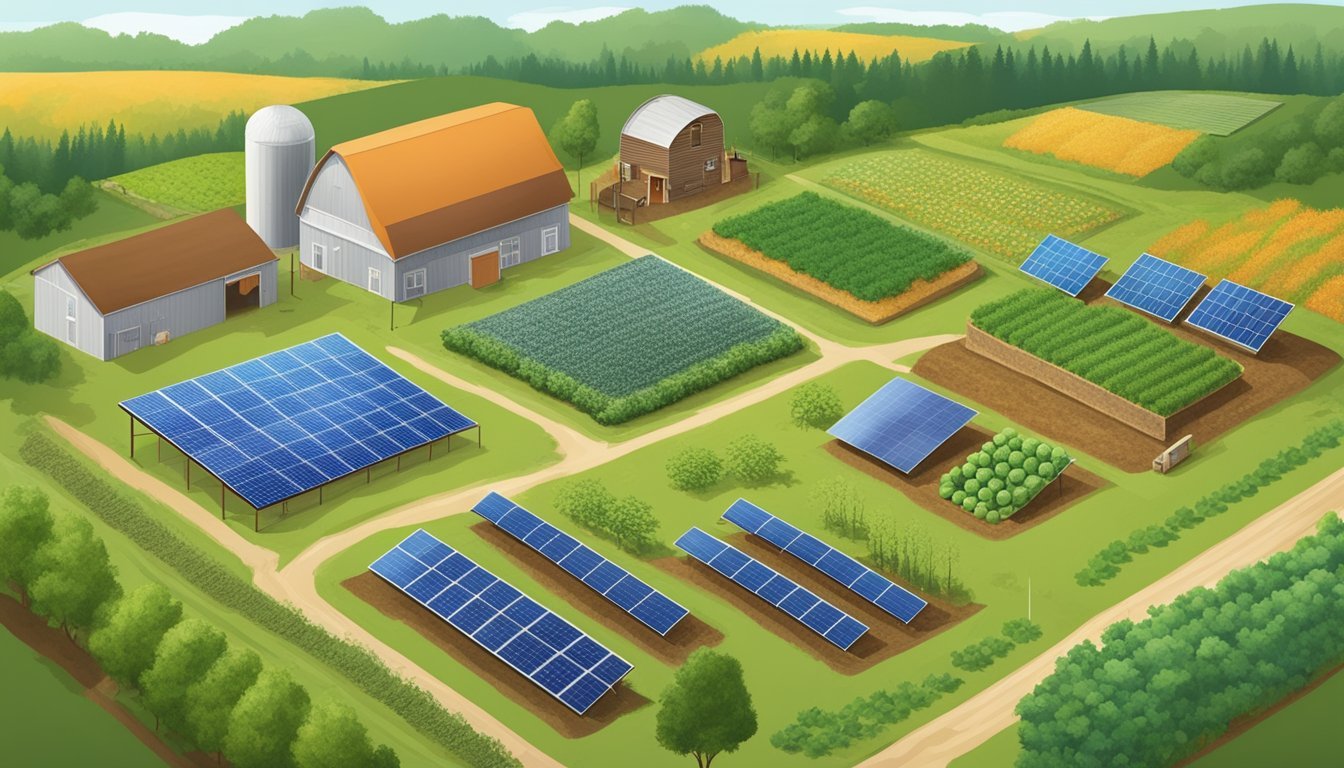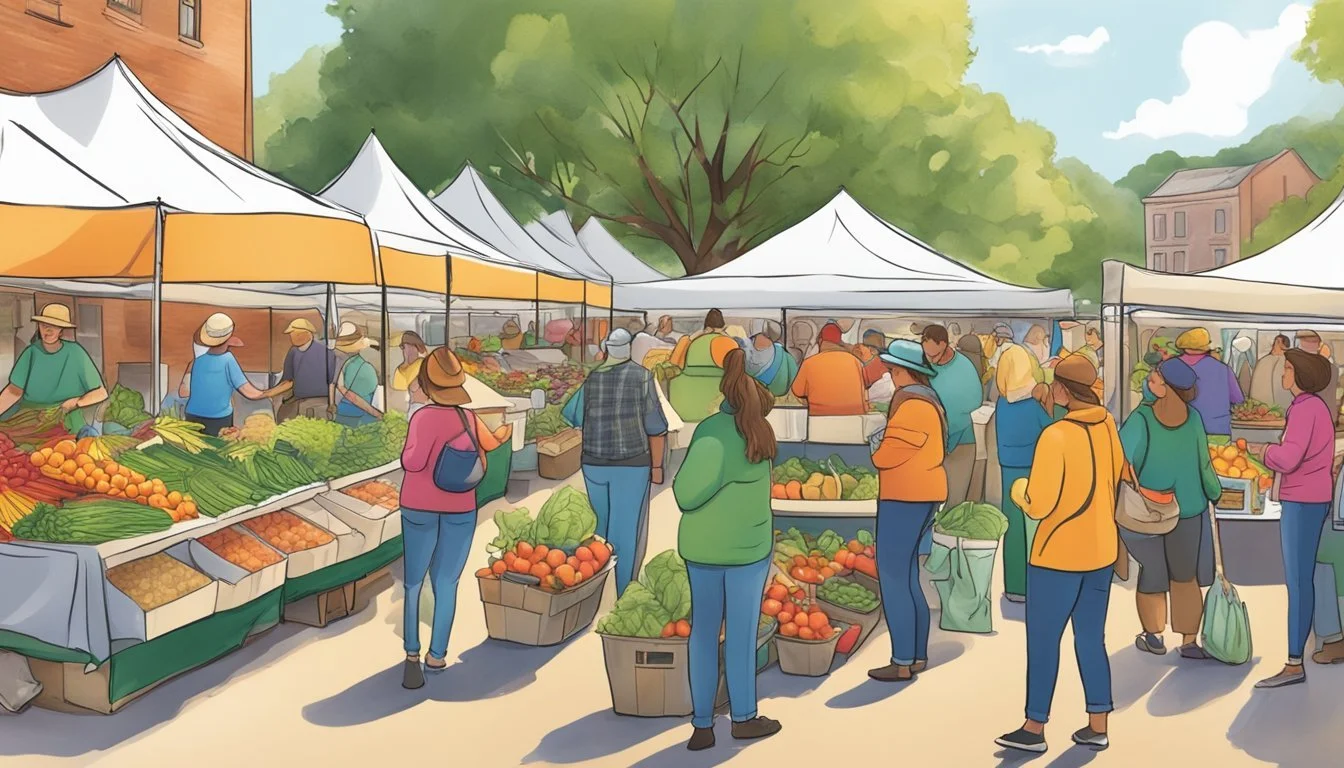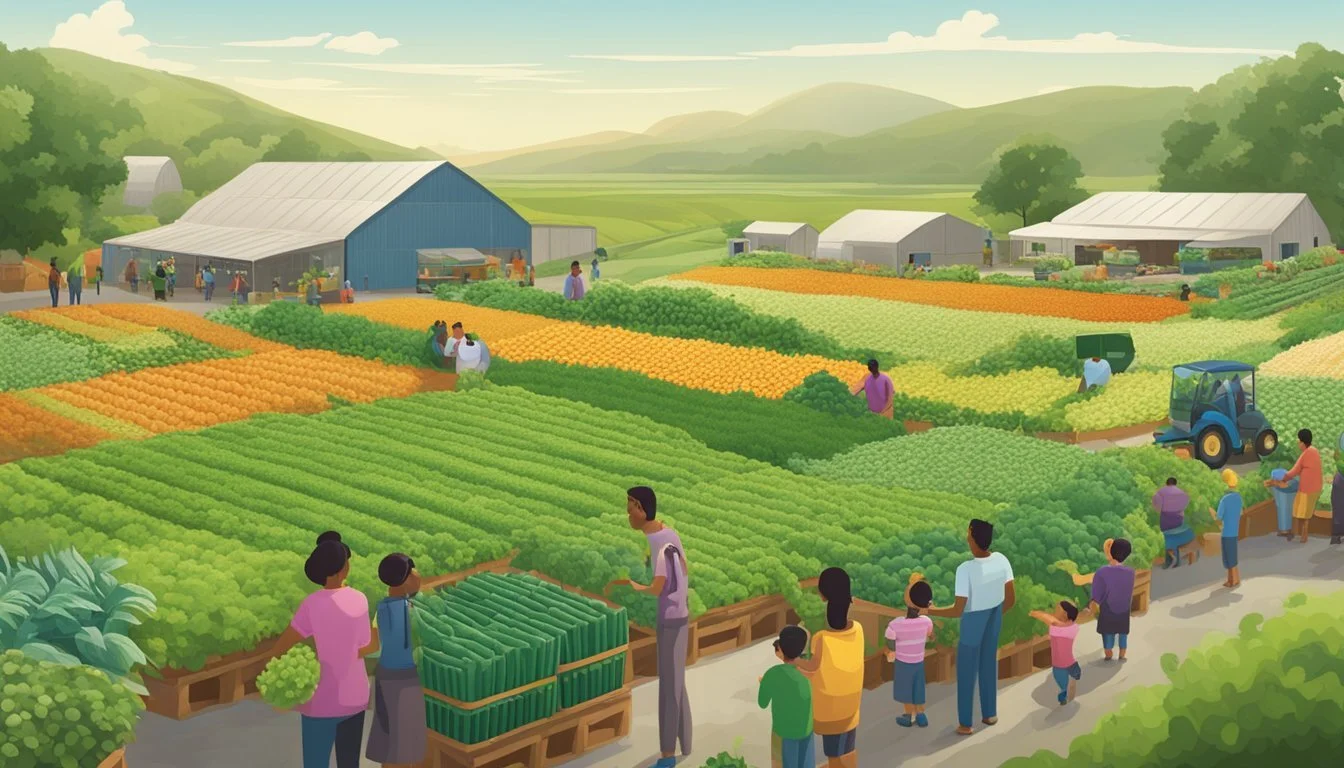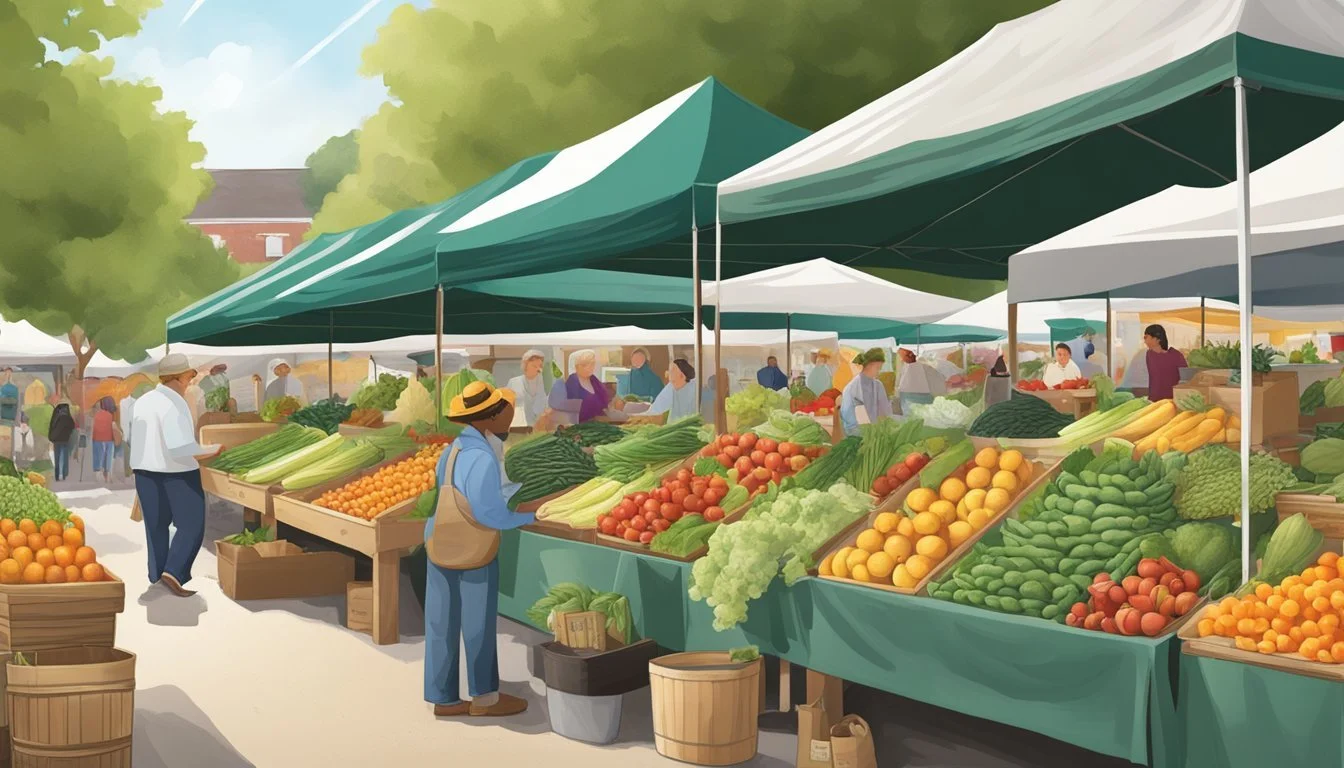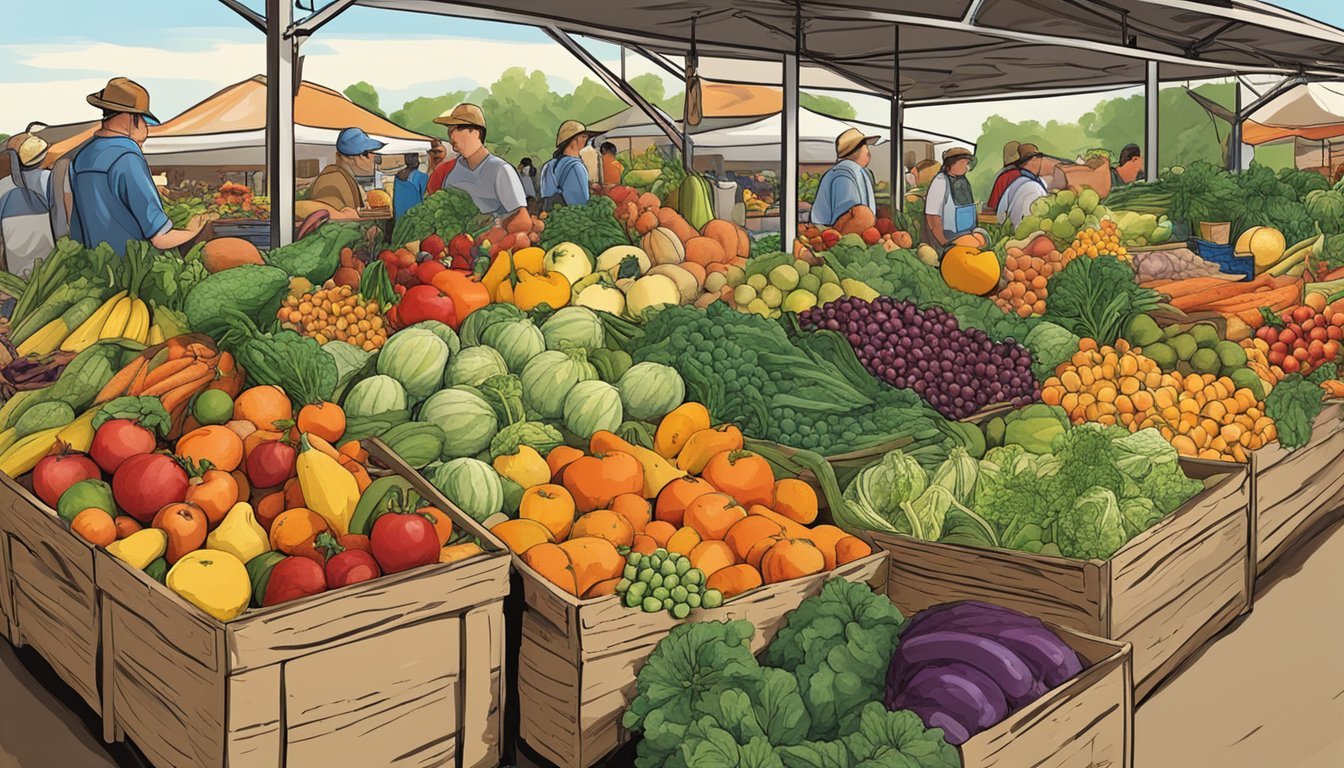Community Supported Agriculture in Wisconsin
A Guide to Local CSAs
Community Supported Agriculture, commonly known as CSA, is a partnership model between local farmers and community members in Wisconsin and beyond. Through CSA programs, consumers purchase shares of a farm's harvest in advance, providing farmers with the needed capital at the start of the growing season. This model gives farmers financial security and allows consumers to receive fresh, locally-produced food, often with organic options.
In Wisconsin, the CSA movement has been embraced by many farms and families looking for a connection to the land and the source of their meals. The FAIRSHARE CSA Coalition, based in Madison, plays a pivotal role in supporting this movement. It comprises more than 50 farms that offer CSA shares to the local community, aiming to strengthen the local food system and secure access to organic produce for all families.
The CSA model in Wisconsin reflects a commitment to promoting sustainable agriculture and fostering close relationships between growers and consumers. It enables individuals to enjoy seasonal produce while supporting the viability of family farms and the growth of the local economy. CSA members often appreciate the direct access to high-quality food and the opportunity to learn more about how their food is grown.
Origins and Principles of CSA
Community Supported Agriculture (CSA) embodies a partnership model in agriculture that focuses on sustainable practices and fosters a direct relationship between consumers and producers.
Historical Overview
Community Supported Agriculture first emerged in Wisconsin near Milwaukee and the Twin Cities in 1988. The beginnings of CSA in the United States, however, trace back to 1986 with pivotal farms like Indian Line Farm in Massachusetts and Temple-Wilton Community Farm in New Hampshire. These pioneers were influenced by European concepts of shared agricultural responsibility and sought to implement similar systems in the U.S.
Core Values and Principles
The foundation of CSA is built on mutually beneficial relationships and sustainable agricultural practices.
Relationships: At its heart, CSA is about the relationship between local farmers and community members who become shareholders or subscribers to a farm's harvest.
Sustainability: Farmers practicing CSA adhere to sustainable agriculture methods, aiming to be ecologically sound, economically viable, and socially responsible.
Partnership: This model is a partnership where risks and benefits are shared. Community members gain access to fresh produce, while farmers receive a more stable income and a direct market for their products.
Community Support: The community's upfront investment in the farm's operations provides the necessary capital to plan for the season ahead.
By following these principles, CSA programs in Wisconsin and beyond aim to renew the connection between people and the source of their food while promoting land stewardship and community engagement.
Benefits of Joining a CSA
Community Supported Agriculture (CSA) in Wisconsin offers a unique opportunity for consumers to establish a direct link with local farms, ensuring healthy, organic, and sustainable produce. Subscribers can collectively invest in local farmers' success, receiving seasonal shares of fresh goods while fostering a robust local food system.
Connecting with Local Farms
Subscribing to a CSA strengthens ties between consumers and the local farming community. By purchasing shares, members directly support farmers' livelihoods and contribute to the sustainability of regional agriculture. This partnership aids local economies and ensures consumers have a reliable source of locally grown food.
Health and Nutritional Advantages
Consumers benefit nutritionally by having consistent access to fresh, often organic produce. Local foods are typically fresher, which can result in higher nutrient content. In addition, CSAs often encourage diversification of diets through the introduction of a variety of fruits and vegetables, some of which may be less common in the average consumer's diet.
Environmental Impact
Participating in a CSA can lead to a smaller carbon footprint as it reduces reliance on long-distance food transportation. Sustainable farming techniques often employed by CSA farms also contribute to ecological health by preserving soil quality, conserving water, and reducing the need for harmful pesticides.
CSA Operations in Wisconsin
Community Supported Agriculture (CSA) is a vital part of Wisconsin's agricultural landscape, connecting local farmers directly with consumers. It's a collaboration that benefits both the producers and the community, enhancing the economic stability of the farming sector in the state.
CSA Farm Structure and Organization
In Wisconsin, CSA farms are organized to serve local communities through a system in which consumers purchase shares of a farm's harvest in advance. These shares typically consist of a variety of farm products, including vegetables, fruits, and sometimes dairy or meat. Shareholders essentially become partners with the farm, sharing the risk and bounty of agricultural production. Farms offering CSA shares often vary in size and scope, with approximately 50 farms listed by the FairShare CSA Coalition in the Madison area alone.
Role of FairShare CSA Coalition
The FairShare CSA Coalition is a nonprofit organization impacting Wisconsin by supporting CSA farms and consumers. Based in Madison, the coalition represents over 40 CSA farms across the region. It plays a key role in promoting CSA practices, ensuring consumer access to local, organic farm products, and operating as the backbone of a strong local food system. They facilitate farm connections through:
A custom farm search
An interactive map of pickup locations
Assistance to limited-income households for purchasing CSA shares
FairShare's work is fundamental to the viability of CSA operations within Wisconsin, striving for a future where all families have access to locally-produced, organic food.
Economic Impact on Wisconsin Agriculture
The CSA model has a significant economic impact on Wisconsin's agriculture, providing farmers with financial predictability and supporting traditional family farming. Consumers' pre-season payments help farmers plan and fund the upcoming growing season. In turn, this economic framework allows for sustainable farming practices that contribute positively to the local economy. The CSA system encourages a resilient food economy where consumers are more directly connected to the source of their food, thereby fostering a greater understanding and appreciation of regional agriculture.
Types of CSA Shares Offered
Community Supported Agriculture in Wisconsin offers a variety of CSA share types to meet the diverse needs and preferences of consumers. Each share represents a portion of the farm's harvest, providing households with fresh and locally-grown products throughout the growing season.
Standard Produce Shares
Standard produce shares typically consist of a variety of vegetables and, at times, fruit. These are the core offerings of most CSA farms, catering to the average household's weekly needs. Members receive a box containing an assortment of seasonal produce, which may include lettuces, tomatoes, carrots, and more, depending on the time of year.
Contents: Vegetables (e.g., leafy greens), Fruit (seasonal)
Pick-Up: Weekly/Biweekly
Suitable for: Individuals, families
Meat and Egg Shares
For those interested in local, sustainably-raised meats and eggs, several Wisconsin CSA farms provide meat and egg shares. These shares allow consumers to source their protein directly from the farmers who raise the animals, ensuring quality and traceability.
Contents: Beef, Pork, Poultry, Eggs
Pick-Up: Varies by farm
Suitable for: Omnivores, those looking for local meat options
Specialty Crop Shares
Apart from standard produce, some farms offer specialty crop shares that focus on specific types of produce or value-added products. These might include shares specifically for items such as flowers, herbs, or even less common vegetables.
Contents: Flowers, Herbs, Specialty Vegetables
Pick-Up: Varies by farm
Suitable for: Enthusiasts, gardeners, cooks seeking unique ingredients
Finding and Selecting a CSA Farm
When seeking a CSA farm in Wisconsin, it is crucial to consider various elements that align with your preferences, locate farms using efficient search tools, and explore financial assistance programs to ensure affordability.
Factors to Consider
When choosing a CSA farm, members should evaluate:
Location: Proximity to home or work for ease of picking up shares.
Farm Practices: Agricultural methods such as organic or sustainable farming.
Variety of Produce: Diversity of crops offered throughout the season.
Share Sizes: Availability of different share sizes to suit household needs.
Pick-up/Delivery Options: Convenience and logistics of obtaining shares.
Farm Participation: Opportunities for involvement in farm activities.
Communication: How farms communicate with members about weekly offerings and farm events.
Farm Search and Directories
Prospective members can find a CSA farm by utilizing:
FairShare CSA Coalition's Farm Search Tool: A comprehensive resource that assists in locating over 40 local, organic CSA farms across Wisconsin.
Farmers Markets: Making direct contact to inquire about CSA programs available.
Online Directories: Websites hosting lists of CSA farms with an interactive map feature for pinpointing pick-up locations.
Partner Shares Program and Financial Assistance
Financial considerations include:
Partner Shares Program: This initiative by FairShare CSA Coalition helps limited-income households purchase CSA shares.
Sliding Scale Pricing: Some farms offer shares at varying prices based on income.
Payment Plans: Options that allow splitting the cost of shares into manageable installments.
By using these structured approaches, Wisconsin residents can make informed decisions in supporting local agriculture and becoming a part of a community-supported agriculture (CSA) farm, fostering a partnership with local farmers.
CSA Membership and Community Engagement
Community Supported Agriculture (CSA) in Wisconsin serves as a bridge between farmers and consumers, fostering a network of members committed to supporting local, sustainable agriculture. Membership often involves the pre-purchase of a seasonal "share" of the farm's products, enhancing the link between household consumption and the local farm community.
Commitment to the Farm Community
Members of a CSA make a conscious choice to support community-supported agriculture by purchasing shares, which may include a diversity of fresh produce such as fruit and vegetables. This model allows farmers to receive upfront capital while sharing the risks and rewards of the harvest with their members. In return, members often feel a stronger connection to the source of their food, fostering a sense of ownership and responsibility towards the success of the farm.
Volunteer Work and Societal Contributions
Volunteering is integral to many CSA operations, providing a tangible way for members to engage with their community and the agricultural process. Members can contribute through:
Planting and harvesting seasons
Special workdays on the farm
Administrative support or event planning
This engagement not only aids in the farm's productivity but also strengthens communal ties and promotes a deeper understanding of sustainable food production.
Events and Direct Customer Interaction
CSA encourages direct interactions through various events, such as:
Potlucks
Farm tours
Seasonal celebrations
These events create a platform for consumers and farmers to forge personal connections, share knowledge, and celebrate the bounty of the land. CSA members enjoy the unique opportunity to meet their growers, ask questions, and witness the farming practices that produce their weekly shares of fresh, local produce.
Sustainability and Organic Farming Practices
Community Supported Agriculture in Wisconsin integrates sustainability with organic farming practices. The state's CSAs emphasize reliable organic certification, diversified crop production, and enhanced soil health to ensure a sustainable harvest season after season.
Organic Certification and Standards
In Wisconsin, organic farms undergo stringent processes to obtain certified organic status. They must adhere to national standards, which prohibit synthetic fertilizers and pesticides, thereby ensuring that the produce individuals receive is safe and environmentally friendly. Third-party agencies conduct annual inspections to verify that organic farms maintain these standards throughout the growing season.
Diversified Farming Systems
Diversified farming systems are integral to sustainable agriculture. Wisconsin's CSA farms use crop diversity to improve ecological balance and reduce the need for chemical inputs. These farms often employ crop rotation and intercropping to manage pests and diseases, leading to resilient agricultural ecosystems. A diverse array of crops also provides CSA members with a variety of fresh, seasonal produce.
Soil Health and Crop Rotation
Soil health is a cornerstone of sustainable farming practices. Farmers in Wisconsin's CSAs employ crop rotation to preserve soil fertility and structure, which, in turn, supports the productive capacity of the land. Practices such as cover cropping and the application of organic composts enhance microbial diversity and natural nutrient cycling, further bolstering the sustainability of the farming operations. These methods ensure that the soil remains healthy for future harvests and can support continuous greenhouse production where applicable.
Seasonality and Year-Round CSA Models
Community Supported Agriculture in Wisconsin takes advantage of the state's varying seasons, offering diverse options for both farmers and consumers to engage in local food systems year-round.
Summer and Main Growing Season
In Wisconsin, the main growing season typically runs from late spring through early fall. During this period, CSAs offer summer shares that grant members a weekly or bi-weekly distribution of fresh, seasonal produce. The variety of produce available is at its peak, including everything from crisp greens and ripe berries to heirloom tomatoes and sweet corn, all celebrated for their high-quality and intense flavor. These shares are reflective of what is currently being harvested, ensuring that members receive the freshest possible produce straight from the field.
Typical Summer Share Contents:
Fresh greens (lettuces, kale, spinach)
Root vegetables (carrots, beets)
Summer fruits (berries, melons)
Nightshades (tomatoes, peppers, eggplants)
Winter Shares and Extended Harvest
Despite Wisconsin's harsh winters, some CSA farms extend their services through the colder months by providing winter shares. These shares rely on storage crops and greenhouse-grown items to continue delivering fresh food to members. Winter squash, root vegetables, and other hardy produce that store well are common offerings. The extended harvest allows for the distribution of items that have been preserved from the main growing season, maintaining a link between consumers and local farms year-round.
Typical Winter Share Contents:
Storage crops (potatoes, onions, winter squash)
Preserved and fermented foods (pickles, sauerkraut)
Hardy greens and herbs (grown in greenhouses)
Marketing and Distribution of CSA Shares
Community Supported Agriculture (CSA) in Wisconsin capitalizes on direct-to-consumer marketing strategies and leverages distribution networks that include farmers markets and local grocery stores to ensure CSA shares reach consumers efficiently.
Direct-to-Consumer Marketing
CSAs market their shares directly to consumers by highlighting the benefits of fresh, locally-sourced, and often organic produce. Through newsletters, social media campaigns, and community events, CSA farmers in Wisconsin create a narrative that resonates with health-conscious consumers and those invested in sustainable living. Early sign-ups and referral programs are common tactics used by CSAs to secure member commitment, ensuring financial stability throughout the growing season.
Marketing Channels:
Social Media Platforms
Email Newsletters
Informational Workshops
Strategic Partnerships with local businesses, schools, and organizations
Distribution Through Farmers Markets and Stores
Farmers markets serve not only as a venue for selling individual produce items but also for distributing CSA shares directly to members. This offers consumers a chance to meet the farmers and fosters a sense of community. Local grocery stores also partner with CSAs, serving as convenient pick-up points for CSA members. Some CSAs provide the extra service of home delivery, ensuring that even those unable to reach collection points can enjoy fresh local food.
Distribution Points:
On-farm pick-up options
Cooperative food markets
Home delivery service (where applicable)
By integrating seamlessly into local food systems, CSAs in Wisconsin secure their position in both rural and urban markets, providing various distribution options that cater to the needs of today's consumer.
CSA Community Outreach and Education
Wisconsin's Community Supported Agriculture (CSA) networks incorporate outreach and educational programs, promoting sustainable agriculture and community engagement. These efforts range from hands-on workshops to initiatives tackling food accessibility.
Workshops and Farm Tours
CSAs in Wisconsin host a variety of workshops designed to educate members and the public about sustainable farming practices and organic food production. Many CSA farms open their gates to the public for farm tours, where visitors can learn directly from farmers about the agricultural processes. For instance, FairShare CSA Coalition partners with local farms to provide these experiences, fostering a deeper understanding of where food comes from.
Collaboration with Educational Institutions
CSA farms often collaborate with educational institutions such as the University of Wisconsin-Madison to enrich learning opportunities. These partnerships may result in internships, research, and cooperative learning projects. Students and faculty may work together with CSA farms, facilitated by organizations like the Center for Integrated Agricultural Systems, to advance both academic knowledge and practical agricultural skills.
CSA and Food Accessibility Initiatives
Improving food accessibility is a pivotal aspect of CSA outreach. FairShare CSA Coalition, for example, assists limited-income households in purchasing CSA shares, ensuring that fresh, local produce reaches a diverse range of community members. Additionally, some CSA programs attend farmers markets and offer shares designed for donation to charitable entities such as homeless shelters, underlining the commitment to food equity and community support.
Future of CSA in Wisconsin
Wisconsin's CSA operations are poised for growth and transformation. Key developments include technological advancements, greater accessibility, and the navigation of upcoming challenges.
Innovations in CSA Farming
CSA farms in Wisconsin are embracing innovation to improve efficiency and sustainability. New farming practices and tech-driven solutions are being incorporated to enhance production. For instance, some farms use software for crop planning and member management, while others explore hydroponics and vertical farming to expand their growing seasons and increase yields.
Expanding CSA Accessibility
Efforts to make CSA shares more accessible to a diverse range of Wisconsin residents are underway. Initiatives like the FairShare CSA Coalition's partner shares program aim to assist limited-income households in affording CSA shares, thus broadening the community's reach and ensuring more families can partake in locally-produced, organic food.
Challenges and Prospects
CSA farms in Wisconsin face challenges such as climate change, economic pressures, and evolving consumer preferences. While these issues are significant, CSA holds strong prospects for the future. Wisconsinites have demonstrated increasing interest in supporting local agriculture, evidenced by the stability and growth of CSA membership numbers. Farms are also forming coalitions to share resources and expertise, enhancing their resilience against these challenges.
Additional Resources and Information
When exploring Community Supported Agriculture (CSA) in Wisconsin, individuals have access to a variety of resources that provide comprehensive information and support. These resources are pivotal for connecting farmers with consumers, and ensuring the growth and sustainability of local agriculture.
Websites and Online Platforms
FairShare CSA Coalition (csacoalition.org): This non-profit organization is dedicated to connecting consumers with local, organic CSA shares. They provide a custom farm search and an interactive pickup locations map, which makes selecting a farm that matches specific needs straightforward.
LocalHarvest (localharvest.org): A national directory that includes family farms and other local food sources across the United States. It lists many Wisconsin CSAs and provides tools for individuals to easily find and support them.
Facebook: Social media groups and pages related to individual Wisconsin CSA farms or organizations provide updates, events, and community discussions, making it easier for consumers to engage and make informed decisions.
Agricultural Agencies and Non-Profits
USDA (United States Department of Agriculture): An agency that provides support and information regarding agricultural practices, policies, and programs including those related to CSAs and sustainable agriculture.
Sustainable Agriculture Research and Education (SARE): This agency offers extensive resources on sustainable farming practices which can be valuable for CSA practitioners in Northeast Wisconsin and beyond, striving to enhance environmental health and farm profitability.
Non-Profit Organizations: Engaging with local non-profits dedicated to sustainable agriculture can provide additional support and information to both farmers and consumers interested in the CSA model.
These resources offer pathways for individuals to deepen their understanding of CSA and contribute to the sustainability of local agriculture in Wisconsin.
FAQs and Consumer Tips
What is CSA?
Community Supported Agriculture (CSA) enables consumers to purchase a "share" from local farms, ensuring a regular supply of fresh, often organic products throughout the growing season.
How to Select a CSA?
Location: Choose a pick-up location convenient for you.
Produce: Review what types of produce each CSA offers.
Shares: Determine the size and frequency of shares that match your needs.
Benefits of Joining a CSA?
Access to fresh, locally-produced food
Supports local agriculture and economy
Potential exposure to new varieties of produce
Fosters community between farmers and consumers
Crop variation: Shareholders share the risk of farming, meaning produce availability may vary.
Non-refundable: Most shares are non-refundable, committing consumers for the season.
Tips to Maximize Your CSA Experience:
Plan Meals: Utilize all produced by planning meals around your CSA haul to reduce food waste.
Storage Tips: Learn proper storage techniques to keep produce fresh longer.
Understanding Farming Practices:
Farming practices vary; many CSAs use organic methods, but confirm with your farm.
Questions to Ask Before Joining:
Is the farming method organic or conventional?
What types of produce are included?
Are there options for share sizes?
Food Waste and CSA:
By taking only what they need, members can mitigate food waste.
Some CSA programs donate surplus to reduce waste even further.
Note: This concise section provides the basics to guide individuals interested in Wisconsin's CSA options. Always communicate directly with the farms for specific inquiries.

